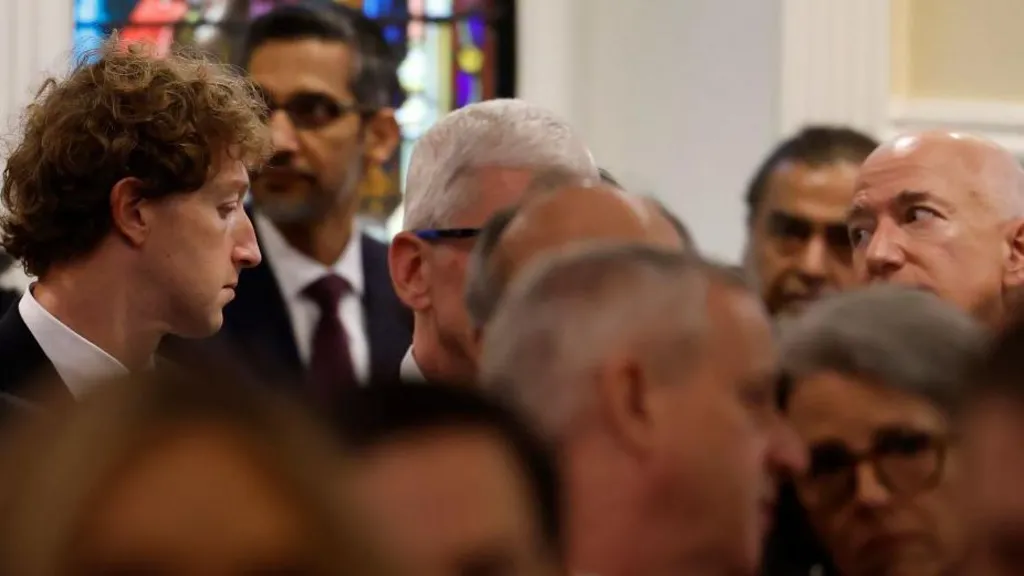Introduction: The Power Players of Tech
The technology industry has consistently been a breeding ground for innovation and disruption, primarily driven by influential leaders whose decisions shape not only their companies but also the broader landscape of the sector. Prominent figures such as Jeff Bezos, Sundar Pichai, Tim Cook, and Mark Zuckerberg have risen to prominence not merely because of their technical acumen or visionary ideas, but also due to the significant relationships they have cultivated throughout their careers. Understanding the dynamics of personal interactions in these individuals’ professional lives offers valuable insights into their leadership styles and strategic decisions.
At the helm of industry giants like Amazon, Google, Apple, and Meta, these leaders demonstrate that success in the tech space is closely tied to the networks they create and maintain. Personal relationships often provide the essential support needed for navigating challenges and seizing opportunities. For instance, Jeff Bezos’s relationship with investors and partners has been instrumental in Amazon’s expansive growth from an online bookstore to a global commerce leader. Similarly, Sundar Pichai’s emphasis on collaboration and open communication at Google has fostered a culture of innovation and agility, contributing to the company’s impressive performance.
Moreover, Tim Cook has expertly leveraged his extensive connections within the industry to steer Apple toward sustainability and diversity, proving the significance of strategic alliances. Meanwhile, Mark Zuckerberg’s relationships in the tech community have enabled him to navigate complex regulatory environments while pushing forward on initiatives designed to reshape social media and digital communication. As we delve deeper into the lives of these tech titans, we will uncover how their personal interactions, values, and partnerships play a crucial role in their leadership impact and the overarching evolution of technology.
Jeff Bezos: From Founder to Philanthropist
Jeff Bezos, the founder of Amazon, has emerged as one of the most influential figures in the technology sector and the broader business landscape. He established Amazon in 1994, initially as an online bookstore. Under his leadership, Amazon transformed into an e-commerce giant, expanding its operations to include a vast array of products and services, such as cloud computing through Amazon Web Services (AWS), streaming video, and artificial intelligence. This evolution has significantly impacted consumer behavior and set the standard for retail innovation worldwide.
Bezos’s relentless pursuit of customer satisfaction and operational excellence has not only cemented Amazon’s position as a leader in the market but has also influenced how technology companies approach service and logistics. His approach to leadership, characterized by data-driven decision-making and a willingness to embrace risk, has enabled Amazon to adapt and thrive in an ever-changing technological environment. Throughout his tenure, he fostered a corporate culture that encourages experimentation, often leading to groundbreaking initiatives and significant technological advancements.
In recent years, Bezos has transitioned from his role as CEO of the company to focus more on philanthropic efforts and long-term visionary projects. He established the Bezos Day One Fund, which aims to provide support for homeless families and build a network of nonprofit preschools in low-income communities. His commitment to philanthropy reflects a growing trend among tech leaders to leverage their wealth for societal benefit. Additionally, Bezos’s personal relationships, particularly with his girlfriend Lauren Sánchez, have drawn media attention, with reports suggesting that her influence may play a role in shaping his philanthropic pursuits and broader vision for the future.
This transformation from a corporate leader to a philanthropist illustrates Bezos’s evolving priorities while maintaining his foundational ethos of innovation and efficiency. As he continues to impact both technology and philanthropy, his legacy becomes increasingly intertwined with global advancements and charitable initiatives, demonstrating how personal and professional relationships can influence significant societal contributions.
Jeff Bezos and His Girlfriend: A Love Story
Jeff Bezos, the founder of Amazon and a prominent figure in the technology sector, has often been in the public eye for both his business ventures and his personal life. Since his highly publicized divorce from MacKenzie Scott in 2019, Bezos has been in a relationship with Lauren Sánchez, a media executive and pilot. Their relationship has garnered significant media attention, reflecting not only their romantic connection but also their shared interests and mutual support in professional endeavors.
The evolution of Bezos and Sánchez’s relationship has unfolded against a backdrop of significant personal changes for the tech mogul. What began as a friendship, they have openly discussed the deep bond they share, emphasizing trust and support as fundamental components of their partnership. This relationship has become integral to Bezos’s life, offering him emotional grounding and companionship amidst the challenges of running a global enterprise.
Furthermore, Sánchez has played an influential role in helping Bezos navigate his post-divorce life. Their synergy is not limited to personal aspects alone; both share a vision for philanthropy and adventure, often engaging in bold initiatives together. Bezos’s venture into space exploration with Blue Origin has been a shared passion, with Sánchez actively participating in these pursuits. This joint endeavor not only speaks to their compatibility but also highlights how supportive relationships can impact one’s ambitions and personal growth.
In navigating the highs and lows of his private life, Bezos has demonstrated that personal relationships can significantly impact an individual’s outlook on life and business. The trust and encouragement that flow between him and Sánchez serve as reminders of the importance of emotional connections in achieving personal and professional stability. As they continue to grow together, their relationship exemplifies a harmonious blend of love and partnership in the often demanding world of technology and leadership.
Sundar Pichai: The Visionary CEO of Google
Sundar Pichai’s journey to becoming the CEO of Google and its parent company, Alphabet Inc., is a testament to visionary leadership and innovative thinking within the tech industry. Born in Madurai, India, Pichai demonstrated remarkable academic prowess, earning degrees from the Indian Institute of Technology Kharagpur, Stanford University, and the Wharton School of the University of Pennsylvania. His technical background, combined with strong interpersonal skills, has made him an effective leader who prioritizes collaboration and inclusivity.
Upon joining Google in 2004, Pichai initially worked on the Google Toolbar and later led the development of Google Chrome, which has become one of the most popular web browsers globally. His ability to recognize and nurture talent within his teams reflects his leadership style characterized by empathy and motivation. Pichai fosters an environment where innovative ideas are valued, encouraging his employees to experiment and take risks without fear of failure. This approach has been instrumental in fostering creativity, leading to new products and features that have defined Google’s evolution.
Pichai’s experiences and values play a crucial role in shaping his vision for Google. He emphasizes the importance of technology in improving lives, advocating for responsible innovation that aligns with ethical considerations. Under his leadership, Google has made strides toward enhancing user experience through artificial intelligence, cloud computing, and sustainability initiatives. His commitment to connectivity and accessibility reinforces Google’s mission to provide information to everyone globally, illustrating how his relationship-driven approach has catalyzed technological advancements and global outreach. As Pichai continues to guide Google, his influence as a leader underscores the significance of human connections in an increasingly digital landscape.
Tim Cook: The Steady Successor of Apple
Tim Cook’s ascension to CEO of Apple Inc. in 2011 marked a pivotal moment in the tech industry, following the visionary leadership of Steve Jobs. Under Cook’s stewardship, Apple has enjoyed a period of sustained growth and innovation, demonstrating his ability to proficiently navigate the complexities of both business and technology. Cook’s leadership style is notably characterized by operational efficiency and meticulous attention to detail, which have been crucial in maintaining Apple’s status as a market leader.
One of the significant aspects of Cook’s leadership is his unwavering commitment to privacy and user security. Recognizing the growing concerns related to data protection, Cook has consistently advocated for robust privacy policies, setting Apple apart from competitors. This focus not only builds trust with consumers but also aligns with a broader industry shift towards safeguarding user information. Cook has effectively demonstrated that a commitment to privacy can coexist with profitability, thereby elevating Apple’s brand value in an increasingly data-driven world.
In addition to privacy, Cook has made substantial strides in promoting sustainability within Apple’s operations. His initiatives to transition Apple towards renewable energy and reduce its carbon footprint have not only showcased corporate responsibility but also set a benchmark within the tech sector. Cook’s leadership has embodied the idea that ecological sustainability is integral to business success, thereby encouraging other tech companies to follow suit.
Inclusivity has also been a cornerstone of Cook’s leadership philosophy. He has worked diligently to foster a diverse and inclusive workplace at Apple, recognizing that varied perspectives drive innovation. Cook’s advocacy for social issues reflects a broader vision of leadership, wherein relationships and employee well-being are prioritized alongside organizational goals. This approach cultivates a positive corporate culture, enhancing employee satisfaction and retention.
Finally, Tim Cook is known for his balanced approach to work-life dynamics, demonstrating that effective leadership includes the well-being of both leaders and their teams. His dedication to maintaining such equilibrium emphasizes his understanding of the intricate relationship between personal well-being and professional success.
Mark Zuckerberg: The Face of Social Media Innovation
Mark Zuckerberg’s journey in the tech world began at Harvard University, where he developed a simple social networking site called “Facemash” in 2003, a project that ignited his passion for connecting people online. By 2004, Zuckerberg and his college roommates co-founded Facebook, initially intended as a platform exclusive to Harvard students. However, the rapid growth of the site soon expanded its reach, allowing users from various educational institutions to join. This exponential expansion marked the beginning of Facebook’s journey to becoming a global phenomenon in the realm of social media.
Throughout his journey, Zuckerberg faced numerous challenges, including competition from emerging platforms and concerns regarding privacy and content moderation. The company’s trajectory was not without controversy, as it navigated issues related to user data security, the spread of misinformation, and its influence on public discourse. These challenges prompted Zuckerberg to refine his leadership approach and engage in numerous dialogues about the responsibilities of tech companies in curating the online experience.
Zuckerberg’s personal beliefs and relationships have played a significant role in shaping Facebook’s development and policies. His vision of an open and connected world has led to policies that prioritize user engagement and communication. However, this vision has often clashed with socio-political realities, leading to debates about the ethical implications of social media. As a leader in the tech space, Zuckerberg exemplifies the intricate balance between innovation and the ethical responsibilities that come with it. His ability to adapt and respond to the changing landscape of social media reflects the complex relationship between leadership and the public’s trust in technology. This ongoing evolution continues to impact not only Facebook but also the wider social media ecosystem.
The Interplay of Personal and Professional Life
In the fast-paced and ever-evolving world of technology, the personal lives of leaders often play a significant role in shaping their professional decisions. The interplay between personal and professional spheres can be particularly influential in organizations including Amazon, Google, Apple, and Facebook. As these leaders navigate the complexities of their roles, the support networks they cultivate and the balance they maintain between work and home life become critical factors in their decision-making processes.
For instance, many tech leaders have shared how personal relationships contribute to their management style and the corporate culture they foster within their organizations. Individuals such as Jeff Bezos and Sundar Pichai have emphasized the importance of strong family connections and friendships, which provide them with emotional stability and perspectives that influence their leadership approach. The support received from family and friends can often translate into a more empathetic leadership strategy, allowing these executives to build resilient and cohesive teams.
Moreover, maintaining a healthy balance between personal responsibilities and the demands of running a technology giant is paramount. This balance not only affects the leaders’ well-being but also has repercussions on organizational efficiency and employee morale. Leaders who prioritize their personal lives exhibit a tendency to champion policies promoting work-life balance for their employees, fostering a healthier workplace environment. Furthermore, personal experiences can lead to innovative thinking, as leaders draw from their life journeys to solve problems and inspire new initiatives.
Ultimately, the intertwining of personal and professional lives reinforces the significance of relationships in the tech industry. As leaders like Tim Cook and Mark Zuckerberg navigate their roles, it becomes clear that their personal choices inherently shape the corporate landscape, illustrating the profound impact of personal dynamics on professional success.
Lessons from Tech Leaders: What We Can Learn
The trajectories of influential tech leaders such as Jeff Bezos, Sundar Pichai, Tim Cook, and Mark Zuckerberg unveil valuable lessons that aspiring leaders can incorporate into their own careers. Each of these figures has navigated unique challenges and opportunities, presenting a rich tapestry of insights into the realms of leadership, innovation, and resilience.
One fundamental lesson from Bezos is the importance of customer obsession. His relentless focus on understanding and prioritizing customer needs has been a driving force behind Amazon’s monumental success. This perspective serves as a crucial reminder that effective leadership requires a deep commitment to serving others, whether it’s customers, employees, or stakeholders.
Sundar Pichai’s journey as the CEO of Google illustrates the power of adaptability and a growth mindset. Emphasizing innovation, Pichai has demonstrated that flexibility in leadership styles and openness to new ideas can facilitate organization-wide progress. As technology continues to evolve at an unprecedented pace, the ability to embrace change becomes imperative for effective leadership.
In contrast, Tim Cook’s focus on values-based leadership highlights the significance of ethics and integrity in driving organizational culture. Under Cook, Apple has prioritized environmental responsibility and social equity. Such an approach emphasizes that successful leaders not only drive performance but also instill a sense of purpose within their organizations.
Mark Zuckerberg’s experiences illuminate the importance of interpersonal relationships in leadership. His penchant for building collaborative environments within Facebook underscores how fostering strong connections can catalyze team cohesiveness and innovation. Effective leaders understand that nurturing these relationships can yield substantial benefits in fostering a positive work culture.
By analyzing the paths of these tech luminaries, aspiring leaders can derive actionable insights that combine customer focus, adaptability, ethical stewardship, and strong relationship-building skills. These elements are essential in shaping successful leadership in the tech industry and beyond.
The Future of Tech Leadership
The technological landscape is constantly evolving, and with it comes a significant transformation in the nature of leadership within the industry. As we move further into a digital era, the dynamics of relationships in tech are poised for a notable shift. Future tech leaders will need to adapt their leadership styles to meet the demands of a remote and hybrid workforce. This evolution calls for a greater emphasis on collaboration, transparency, and inclusivity, fostering an environment conducive to innovative thinking and collective problem-solving.
The emergence of a new generation of tech leaders, often characterized by their diverse backgrounds and inclusive approaches, presents opportunities for a fresh perspective on leadership. These individuals are likely to prioritize authentic relationships with their teams, recognizing that strong interpersonal connections can lead to enhanced productivity and creativity. By leveraging digital tools, this new cadre of leaders can effectively cultivate a culture of open communication, accountability, and shared goals, which are essential in driving innovation in today’s fast-paced tech environment.
Moreover, the role of emotional intelligence in tech leadership will be increasingly pronounced. Leaders who demonstrate empathy and adaptability will be better equipped to navigate the complexities of team dynamics and to foster a supportive workplace culture. As technology continues to transform the way we connect and collaborate, leaders must also embrace a mindset of lifelong learning, ensuring they remain abreast of industry trends, technological advancements, and evolving workforce expectations.
In summary, the future of tech leadership will be shaped by the interplay of digital advancements and human relationships. As the industry embraces a more collaborative approach, leaders who focus on building strong, authentic connections will position themselves and their organizations for enduring success. Emphasizing the importance of adaptability and inclusivity, the next wave of tech leaders has the potential to redefine the very essence of leadership in technology.



